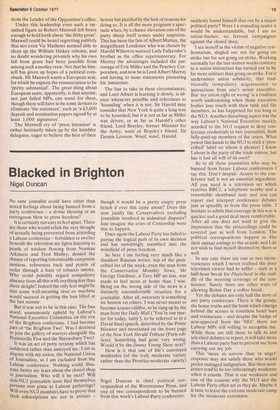Blacked in Brighton
Nigel Duncan
No sane jounalist could have other than mixed feelings about being banned from a party conference — a divine blessing or an outrageous blow to press freedom?
It is certainly not easy to feel upset. There are those who would relish the very thought of actually being prevented from attending a Labour conference — forbidden to swelter beneath the television arc lights listening to pearls of wisdom flowing from Norman Atkinson and Fred Mulley, denied the chance of reporting interminable composite motions, references back and points of order through a haze of tobacco smoke. Who could possibly regard compulsory absence from all this with anything less than sheer delight? Indeed the only fear might be that some well-meaning deus ex machina would succeed in getting the ban lifted at the last minute.
But it was not to be in this case. The ban stood, unanimously upheld by Labour's National Executive Committee on the eve of the Brighton conference. I had become Part of 'the Brighton Two'. Was I destined to join the gallery of martyrs alongside the Pentonville Five and the Shrewsbury Two?
It was an act of petty tyranny which has saddened rather than annoyed me. I am in dispute with my union, the National Union of Journalists, so I am excluded from the Labour conference. Nothing could illustrate better my fears about the closed shop in journalism. Who will it be next? Will non-NUJ journalists soon find themselves persona non grata at Labour gatherings? Will even NUJ members have to prove that their subscriptions are not in arrears — though it would be a pretty empty press bench if ever this came about? Does this now justify the Conservatives excluding jounalists involved in industrial disputes? Just imagine the cries of Censorship were this to happen.
Once again the Labour Party has failed to pursue the logical path of its own decision and has unwittingly stumbled into the minefield of press freedom.
So here I am feeling very much like a dissident Russian writer, top of the proscribed list of the week; even the man from the Conservative Monthly News, Mr George Gardiner, a Tory MP no less, was made to feel more at home than I was. Being on the wrong side of the news is a distinctly uncomfortabtre situation for a journalist. After all, notoriety is something we bestow on others. I was never meant to become a cause célèbre, to be rung up by the man from the Daily Mail ('You're our martyr for today, baby'), to be referred to in a David Steel speech, described by the Prime Minister and mentioned on the front page of the New York Herald Tribune (Paris edition). Something had gone very wrong. Would it be the Jimmy Young Show next?
How is it that one of life's convinced moderates (of the truly moderate variety rather than the Prentice-moderate variety) suddenly found himself shut out by a major political party? Were I a crusading zealot it would be understandable, but I am no union-basher, no fervent campaigner against the closed shop.
I see myself as the victim of negative confrontation, singled out not for going on strike but for not going on strike. Working normally for the last sixteen weeks contrary to a union instruction has turned out to be far more militant than going on strike. For it undermines union solidarity, that traditionally compulsory acquiescence to instructions from one's union executive. But 'my union right or wrong' is a tradition worth undermining when those executive bodies lose touch with their rank and file members, as has happened for too long in the NUJ. Another disturbing aspect was the way Labour's National Executive meekly acceded to the NUJ request to deny conference credentials to two journalists, both fully-paid-up members of the union. What power this hands to the NUJ to stick a 'proscribed' label on whom it pleases! I know Labour is the party of the trade unions, but has it lost all will of its own?
So to all those journalists who may be banned from future Labour conferences I say this. Don't despair. Access to the conference hall is not an essential ingredient. All you need is a television set which receives BBC2, a telephone nearby and a reasonable shorthand note and you can report and interpret conference debates just as speedily as from the press table. I hesitate to admit that coverage in this way is quicker and a good deal more comfortable. After all one does not want to give the impression that the proceedings could be covered just as well from London. The political correspondents happen to like their annual outings to the seaside and I do not wish to find myself shunned by them as well.
In any case there are one or two inconveniences which I never realised the poor television viewer had to suffer — such as a half-hour break for Playschool in the middle of the morning coverage of the conference. Surely there are other ways of allowing Robin Day a coffee break.
Yet the debates are only half the story of any party conference. There is the gossip, the home truths and the hints which emerge behind the scenes in countless hotel bars and restaurants — and despite the badge of non-approval from the NEC there are Labour MPs still willing to recognise me. While there are still those to talk to and televised debates to report, it will take more than a Labour party ban to prevent me from carrying out my job.
This 'mote in sorrow than in anger' response may not satisfy those who would prefer outraged indignation. But then moderates tend to be too infuriatingly moderate when it counts. That is our weakness and one of the reasons why the NUJ and the Labour Party often act as they do. Maybe it is time to leave the extreme moderate camp for the moderate extremists.


































 Previous page
Previous page